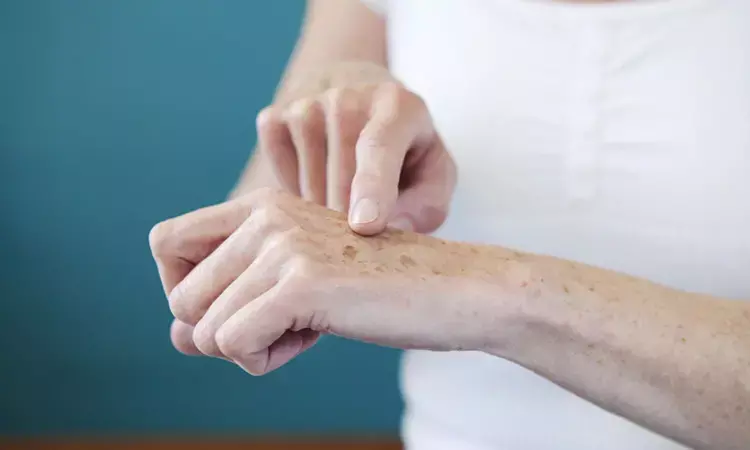- Home
- Medical news & Guidelines
- Anesthesiology
- Cardiology and CTVS
- Critical Care
- Dentistry
- Dermatology
- Diabetes and Endocrinology
- ENT
- Gastroenterology
- Medicine
- Nephrology
- Neurology
- Obstretics-Gynaecology
- Oncology
- Ophthalmology
- Orthopaedics
- Pediatrics-Neonatology
- Psychiatry
- Pulmonology
- Radiology
- Surgery
- Urology
- Laboratory Medicine
- Diet
- Nursing
- Paramedical
- Physiotherapy
- Health news
- Fact Check
- Bone Health Fact Check
- Brain Health Fact Check
- Cancer Related Fact Check
- Child Care Fact Check
- Dental and oral health fact check
- Diabetes and metabolic health fact check
- Diet and Nutrition Fact Check
- Eye and ENT Care Fact Check
- Fitness fact check
- Gut health fact check
- Heart health fact check
- Kidney health fact check
- Medical education fact check
- Men's health fact check
- Respiratory fact check
- Skin and hair care fact check
- Vaccine and Immunization fact check
- Women's health fact check
- AYUSH
- State News
- Andaman and Nicobar Islands
- Andhra Pradesh
- Arunachal Pradesh
- Assam
- Bihar
- Chandigarh
- Chattisgarh
- Dadra and Nagar Haveli
- Daman and Diu
- Delhi
- Goa
- Gujarat
- Haryana
- Himachal Pradesh
- Jammu & Kashmir
- Jharkhand
- Karnataka
- Kerala
- Ladakh
- Lakshadweep
- Madhya Pradesh
- Maharashtra
- Manipur
- Meghalaya
- Mizoram
- Nagaland
- Odisha
- Puducherry
- Punjab
- Rajasthan
- Sikkim
- Tamil Nadu
- Telangana
- Tripura
- Uttar Pradesh
- Uttrakhand
- West Bengal
- Medical Education
- Industry
Groundbreaking study shows novel peel combination as safe and effective for hand lentigines

USA: In a groundbreaking study published in Dermatologic Surgery, dermatologists have unveiled a promising new treatment for hand lentigines, or age spots. The research indicates that a series of three chemical peels, combining 15% trichloroacetic acid (TCA) with 3% glycolic acid (GA), prove to be effective and safe in reducing the appearance of these common skin blemishes.
The study stated that a series of three 15% TCA + 3% GA peels are safe and effective in treating hand lentigines.
"Patients who received a series of TCA + GA peels over three treatments at intervals of 4 weeks showed significant improvements compared to untreated hands," the researchers reported. They noted that the procedure was well-tolerated, with no adverse events observed and minimal pain reported.
Hand lentigines, characterized by small, dark spots on the skin, are often associated with aging and prolonged sun exposure. While various treatments exist, finding a safe and effective approach, particularly for the delicate skin of the hands, has been a challenge.
Improving the appearance of lentigines on the hands is an important component of hand rejuvenation. Soft tissue fillers revolumize hands but do not address pigmentary changes. Kachiu Lee, Department of Dermatology, Temple University, Philadelphia, Pennsylvania, and colleagues aimed to investigate the efficacy of a 15% trichloroacetic acid + 3% glycolic acid combination peel in improving the appearance of hand lentigines.
For this purpose, the researchers performed a prospective evaluator-blinded, split-hand study using a 15% TCA + 3% GA peel for treating hand lentigines. Subjects received three treatments at 4-week intervals on one hand, with the other hand serving as an untreated control.
Final photographs were taken 12 weeks following the last treatment. Improvement in hand lentigines was graded using a 5-point scale by two blinded board-certified dermatologists. 90% of the patients completed the study; the mean age was 64.4 years.
The study led to the following findings:
- The mean pain scores were 3.8 on a 10-point scale (1 = no pain, 10 = extremely painful).
- Blinded evaluators correctly identified the after-treatment photographs in 88% of the patients.
- Physician and patient-graded mean improvement of lentigines was significant for treated versus control hands.
- There were no adverse events.
The findings showed that a series of chemical peels (15% TCA + 3% GA) offer an effective and safe treatment for improving the appearance of lentigines in the hands. It is a cost-effective option versus energy-based devices and has fewer side effects and downtime compared with cryotherapy.
"This cosmetic treatment can be combined with other modalities, such as soft tissue fillers aimed at revolumization, to improve the overall appearance of photoaged hands," the researchers concluded.
These findings represent a significant advancement in dermatology, offering dermatologists and patients a non-invasive and reliable option for addressing hand lentigines. With further research and clinical validation, triple peels may soon become a standard treatment modality, helping individuals reclaim confidence in the appearance of their hands and overall skin health.
Reference:
Alajmi, Ali MD*; Niaz, Ghassan MD*,†; Chen, Christine BA‡; Lee, Kachiu MD, MPH*,§. A 15% Trichloroacetic Acid + 3% Glycolic Acid Chemical Peel Series Improves Appearance of Hand Lentigines: An Evaluator-Blinded, Split-Hand Prospective Trial. Dermatologic Surgery 50(5):p 467-470, May 2024. | DOI: 10.1097/DSS.0000000000004114
Dr Kamal Kant Kohli-MBBS, DTCD- a chest specialist with more than 30 years of practice and a flair for writing clinical articles, Dr Kamal Kant Kohli joined Medical Dialogues as a Chief Editor of Medical News. Besides writing articles, as an editor, he proofreads and verifies all the medical content published on Medical Dialogues including those coming from journals, studies,medical conferences,guidelines etc. Email: drkohli@medicaldialogues.in. Contact no. 011-43720751


